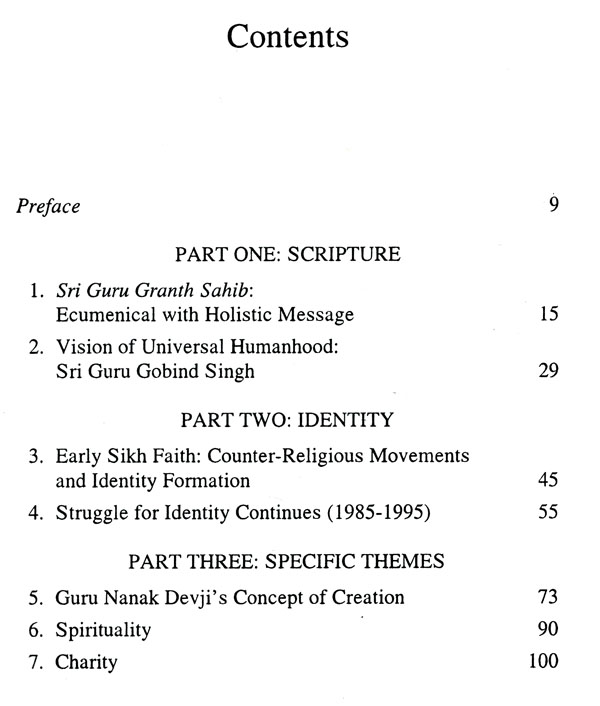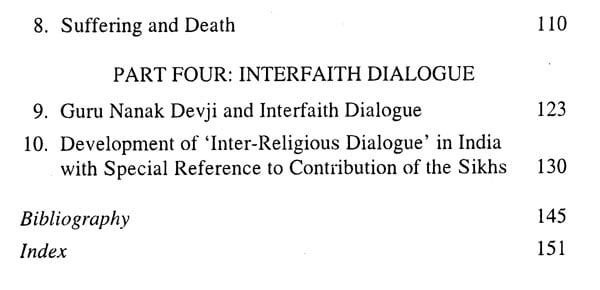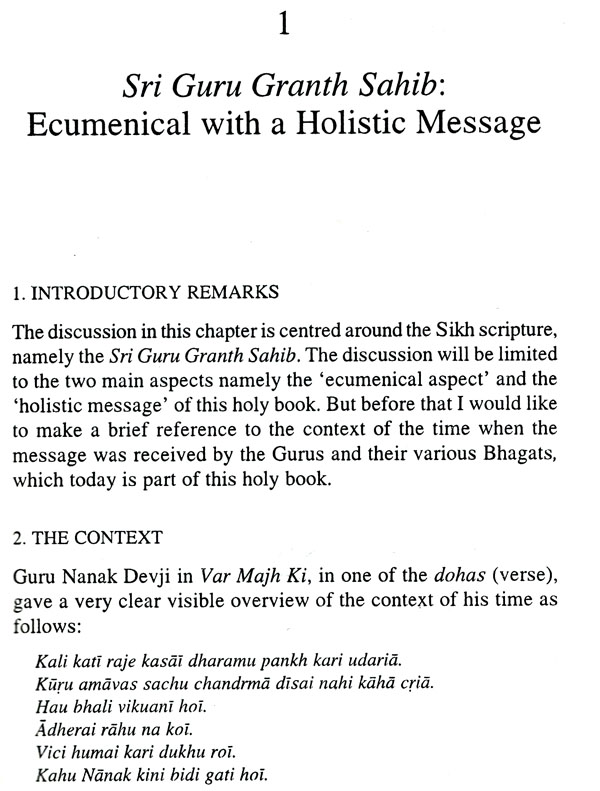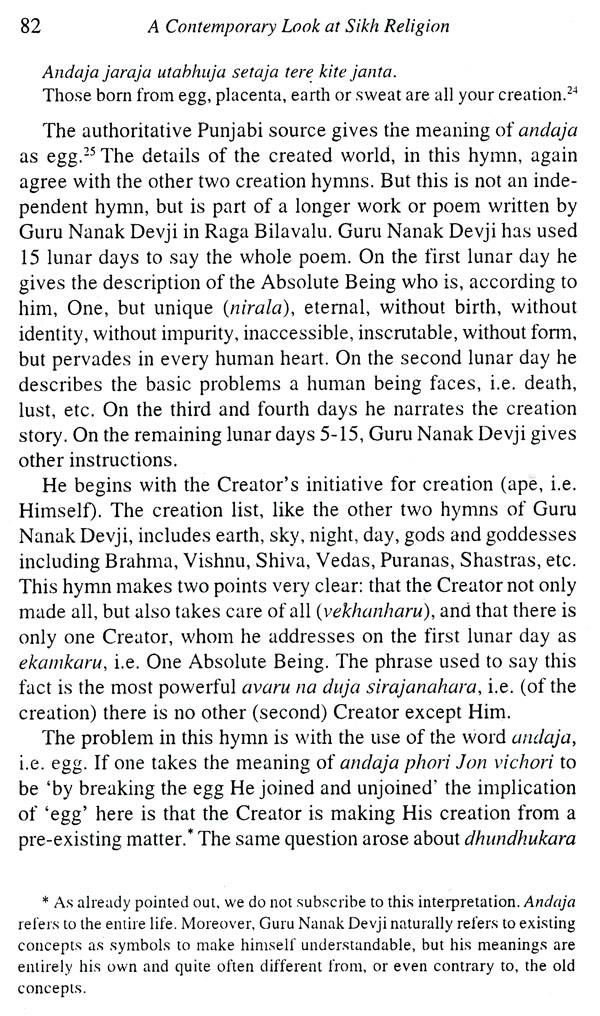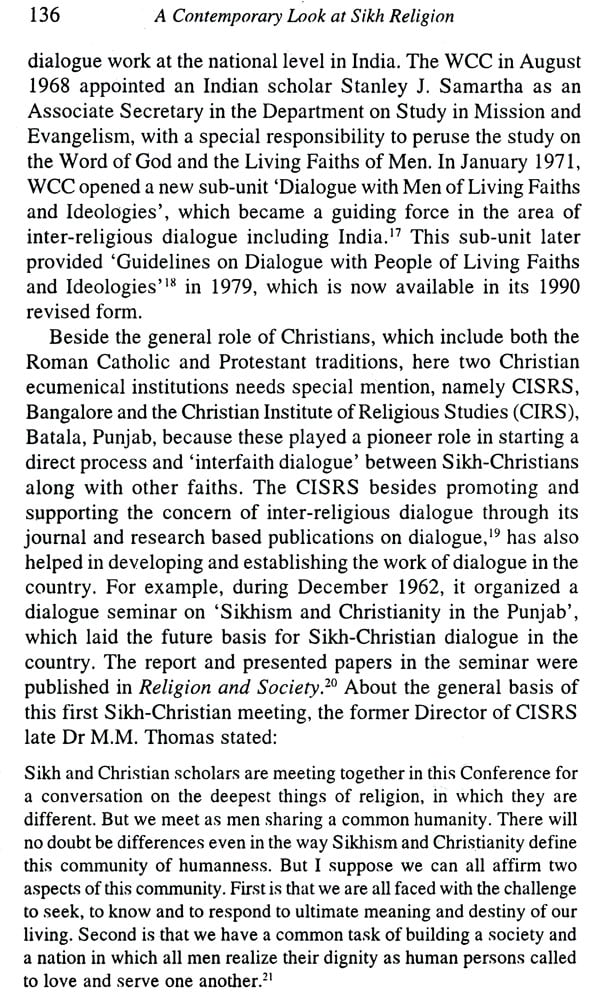
A Contemporary Look at Sikh Religion ( Essays on Scripture, Identity, Creation, Spirituality, Charity and Interfaith Dialogue)
Book Specification
| Item Code: | NAZ649 |
| Author: | James Massey |
| Publisher: | Manohar Publishers and Distributors |
| Language: | English |
| Edition: | 2010 |
| ISBN: | 9788173048579 |
| Pages: | 156 |
| Cover: | HARDCOVER |
| Other Details | 9.00 X 5.50 inch |
| Weight | 350 gm |
Book Description
The ten essays in this volume are divided into four parts. In part one, the first essay deals with the Sikh scriptures including Sri Guru Granth Sahib. The second essay discusses in detail, the ✓vision and mission of the Universal Humanhood of Sri Guru Gobind Singh n part two, the essays deal with 'Sikh Identity, and show that till today the struggle for identity is continuing. Part three contains four essays dealing with the Sikh concepts of 'creation', `spirituality', 'charity', and 'suffering and death'. Part four contains two essays, one dealing with 'interfaith dialogue' offered by Sri Guru Nanak Devji and the last essay on the historical development of the same process, with special reference to the contribution of the Sikh community. The volume will be of great interest to scholars working on Religion in South Asia in general and Sikh Studies in particular
James Massey is currently the Director of the Centre for D lit/Sub Item Studies and Community Contextual Communication Centre New Delhi and Hon. Secretary of the Board of Theological Education of the Senate of Serampore College (University), West legal. He is Privatdozent, the Faculty of Protestant Theology at the Johann Wolfgang Goethe-University, Frankfurt is Main, Germany.
It was in October 1985, when I was invited to deliver a lecture on the theme 'Fresh Look at Sikh Religion' by the Faculty of Theology of the Johann Wolfgang Goethe-University, Frankfurt, Germany. This lecture not only received a very positive response from the faculty members, it also had an equally good response from Sikh readers, when it got published in the April 1987 issue of the Journal of the Guru Nanak Foundation, New Delhi. This was the beginning of my becoming a serious student of Sikh religion, which actually followed my doctoral thesis at the above-mentioned university on the subject 'The Doctrine of the Ultimate Reality in Guru Nanak's Hymns Found in the Standard Text of the Adi Granth'. After the acceptance of this work for my doctoral degree, it was subsequently published in 1991 (revised edition 2010) by Manohar Publishers, New Delhi. Following this, the further study of the Sikh religion became part of my life on different levels. I have been asked time and again to contribute to writing for Sikh and other journals as well as reviews. I have also been invited to make presentations at local, national, and international level seminars organized by different academic bodies on the subject. The ten essays included in this work are the outcome of the same process. These essays were written at different times for different occasions, but for this work, these have been revised and re-written keeping in view the needs of the present societal context of India as well as the world. The author believes that the message of the Sikh Gurus and other saints, found in the Sri Guru Granth Sahibji, which is the core of Sikh 'faith, is fully relevant in our time, as it was relevant at the time when it was written.
Before I go on to elaborate about the content of the essays contains in this book, one question, I have to answer is the one my Sikh friends, as well as others including Christians, ask me often: How and why I became interested in of Sikh faith particularly as a Christian? It is true that I am not only a Christian but a fully committed Christian. But my answer to the question always includes my being a Punjabi Christian, who is very proud to be a Punjabi. But I am an Indian as well, of which also I am equally proud. The answer to the above question is actually hidden among these identities, which I am carrying I my being because as I stand today, I have become fully aware of my identities, which actually have contributed to my 'thinking' or what we caeoogy' or 'theology' of life. Among these identities, one is very special that of my being a `Punjabi'. As a Punjabi, the Punjabi culture which includes the Punjabi language is two factors that lie at the core of my Punjabi identity. One factor which influenced the formation of such an identity is the religious tradition, particularly for 'cultural heritage'. But we must remember that culture is not identical with religion, but it only draws some elements from a religion.
This is the reason why it is said that there is a very 'thin' line between religion and culture, but it is actually the cultural elements that keep us together. But at the same time, unconscious to us, we continue to share those religious elements which got adopted as part of our culture, and it is those religious elements, which become common to all those who share that 'common identity' In the case of Punjabi' or punjabiat' as an identity, it certainly carries in it the 'values' of Sikh religion because it has been a religion of the majority of inhabitants in Punjab for more than 500 years. It is these Punjabi cultural inherited Sikh values, which I carry in my being. I must add here, that I became more and more conscious of my 'Punjabi identity' from the mid-1970s onwards, which influenced my being as a Christian, the reflections of which can be seen in my book, Christianity: An Introduction (in Punjabi), which I wrote in 1976 and which is supposed to be written in 'Punjabi thought form', clearly seen rooted in the 'Sikh religious traditions' and which can be seen as the contribution of `Sikh religion' to the 'Punjabi culture' or 'Punjabi Christianity'. My becoming more and more conscious of my Punjabi identity is the factor that is responsible for my getting more and more drawn to the Sikh religion. This factor also made me richer as a Punjabi Christian. Seeing myself as part of the 'Punjabi Dalit Community' is another factor that helped me to see with such eyes 'Sikh faith' as well as 'Christian faith' if these offer any message or bring hope to this community (among whom Guru Nanak Devji placed himself as neech when he said, 'the lowest among the low-caste (neech)' (SGGS, p. 15). It is through the eyes of such people that an attempt has been made to Look at the Sikh faith and also justifies the 'A Contemporary Look', which is part of the title of this volume.
**Contents and Sample Pages**